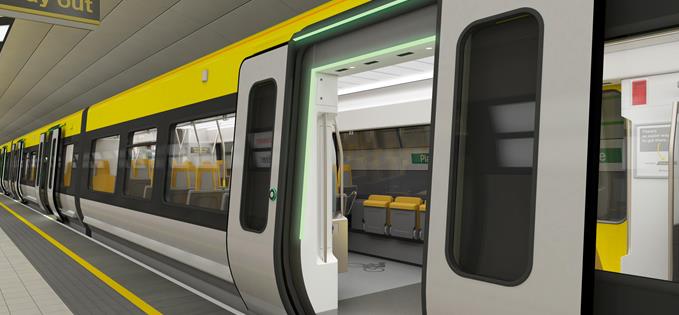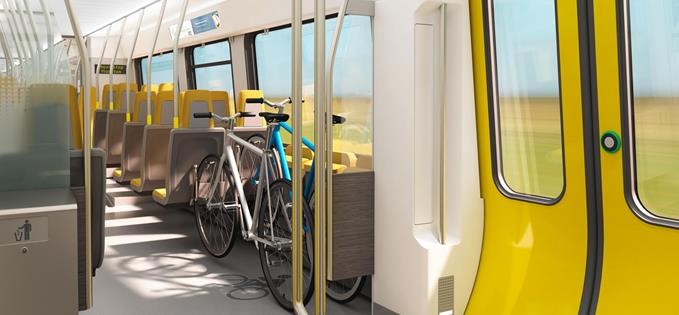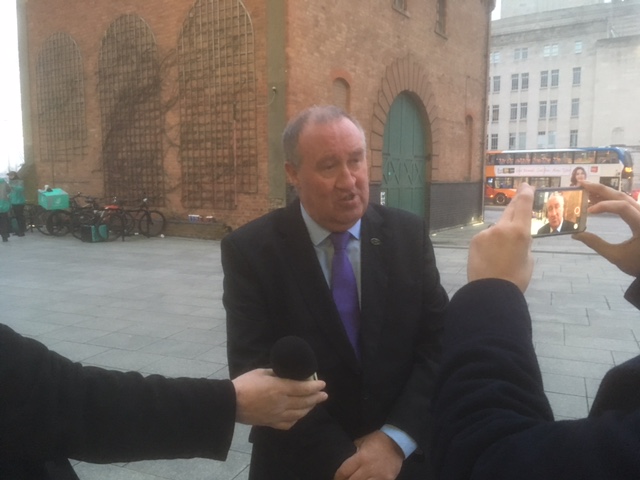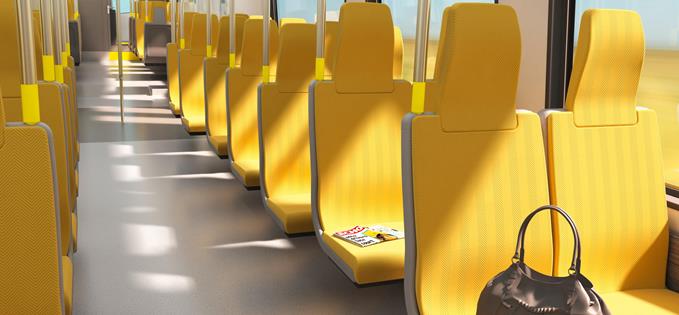MERSEYRAIL'S ageing fleet of trains, the oldest in Britain, is to be replaced in a £460m deal announced today. But it will mean 159 guards losing their jobs with the introduction of driver-operated doors on all of the new fleet.
John Tilley, regional organiser of the transport union RMT, warned the move towards driver operated trains on Merseyrail could provoke an industrial dispute with Merseyrail and said the operator was gambling with people's safety.
What happens if a driver is overcome with fumes when a train is in one of the bores? The fact that there are tunnels is one of the reasons we need guards
But Liverpool Mayor Joe Anderson, chairman of the city region combined authority, said none of the staff will face redundancy as a result of the investment.
The mayor also said the issue of driver-operated door opening on the new Merseyrail trains was far removed from the dispute currently crippling services into London on Southern Railways.
The jobs of 222 guards and guard managers will go, but 63 on-board customer-care staff will be hired to work on the trains. Voluntary early retirement, redeployment or retraining will be offered to affected staff.
Today's meeting at Mann Island when approval for the new fleet was approved was lobbied by officials of the rail union Aslef.
They were later holding private talks with officials, including Cllr Liam Robinson, chairman of Merseytravel.
The union officials made it clear they were not happy with the proposed operating procedures for the new trains, expected to enter service in 2020.
Afterwards, Mr Tilley told reporters: "I've been involved in the rail industry for more than 30 years and I know the importance of safety. What they are effectively saying is 'we can't afford guards so we'll have less safe trains'. The measures they have announced are all well and good, but we need guards on the trains, not customer service people on some trains with clip boards.

"What happens if a driver is overcome with fumes when a train is in one of the bores? The fact that there are tunnels is one of the reasons we need guards.
"We have been having these dialogues for months and I hope to have talks soon with the Merseyrail operator. The company, owned by the Dutch state railway, makes £17m a year profit.
"RMT will use all measures to maintain safety on Merseyrail. What they say about safety is nonsense. We can point to many incidents were guards have intervened and put their lives at risk.
He said the question of drivers operating doors could escalate into a dispute with Merseyrail.
"Around 400 jobs are affected. About 170 people (not 150 as Merseytravel says) will in six months transfer to Stadler who will be taking over maintenance of the existing fleet, and 224 jobs of guards and guard managers will go. This is all about money. They are gambling with people's safety."
But Mayor Anderson said: "I'm not happy about job losses. We have seen thousands of jobs go at the city council. But we are faced with a crumbling fleet of trains. If we had done nothing it would cost us millions of pounds a year extra in running costs.
"The new trains will have many safety features, including extensive CCTV and panic buttons. The new trains will far safer than what we have now."
Merseytravel CEO Frank Rogers said there will be second members of staff on some trains, about 25 percent of the time.
 Space for bikes
Space for bikesThe current 150 depot staff who maintain and service the current fleet will be transferred to Swiss company Stadier who will be building the new fleet in mainland Europe.
The new fleet will be designed to operate beyond the current Merseyrail area, with proposals to extend services to Warrington, Wrexham and Skelmersdale.
Merseytravel said the new trains will be safer and will also make Merseyrail the most accessible traditional network in the country.
The trains will be able to carry 60 per cent more passengers while retaining the same number of seats, will cut journey times by 10 per cent– equivalent of up to nine minutes on some end-to-end routes.
The trains, which will not result in any additional fare increases or council tax rises, will be publically owned by Merseytravel, meaning that they can be designed specifically to suit the network, with features local people have said they want to see.
The new trains’ project also includes infrastructure upgrades to power supplies, platforms and track, as well as refurbishment of the depots at Kirkdale and Birkenhead North and the ongoing maintenance of the trains.
Key features of the new trains:
* More space for bikes, buggies, disabled passengers and luggage; intelligent air conditioning; a bright, open and airy saloon, and a mix of seating types, keeping some of the ‘sociable’ facing seats,– all these points came out of a Transport Focus survey of local users in 2013.
* Easier to get on and off – the most common request in the Transport Focus survey. This will be achieved through reducing the ‘gap’ between the train and platform through: a train body configured specifically for our network; lower train floors; platform and track improvements and a ‘sliding step’ from the train – this combination gives almost ‘level access’ in a first for the UK.
 RMTs regional organiser, John Tilley, warned an industrial dispute could be on the line
RMTs regional organiser, John Tilley, warned an industrial dispute could be on the line* On-board safety – the train will be a ‘safe space’ forming one continuous space with no dividing doors; CCTV with images broadcast within the train saloon and to the driver and control room; a direct link to the driver and control room; the driver visible through a transparent cab door; on-board customer service staff, supplementing other on-board staff and staffed stations.
* Door safety – there will be traffic light system door illuminations indicating when it’s safe to get on and off; sensitive door edges that will detect ‘the pull’ from something as narrow as a tie or finger, stopping the train from moving or bringing it to a stop.
* Wider aisles, larger areas at the doorways and many more grab handles, making the train much easier to move around and safer for standing passengers.
Said Mayor of Liverpool and Chair of the Liverpool City Region Combined Authority, Joe Anderson:
“The people of our City Region need and deserve new trains. Merseyrail is one of the top performing networks in the country and we want to keep it that way. This is a once in a generation opportunity for custom built trains that will be safer and carry more people, more quickly.
“A better rail service will bring a boost to the regional economy of £70m every year, plus 1,000 new jobs. It’s also one our first Devo Deal successes for the City Region as we’ve got commitment for funding that will help make this project happen.
“Unusually, these trains will be owned by us locally, meaning we can make sure the trains are exactly what passengers want and that they are ready for our future plans.”
Added Cllr Rob Polhill, leader of Halton and lead member for transport on the Liverpool City Region Combined Authority:
“The decision today is not just about the new trains themselves but what they will enable us to do.

“These trains will have the capability to operate beyond the current Merseyrail boundaries, potentially bringing the benefits of the high performing network to people in places like Skelmersdale and along the Borderlands line into Wrexham within the next 30 years – helping us deliver our long term rail strategy.
“The new trains will help us improve links within and beyond our area, linking in to the wider ‘Northern Powerhouse Rail’ agenda.”
The new trains will be operated differently, with the driver – assisted by cameras along the length of the train – responsible for the opening and closing of the doors and the dispatch, rather than the guard.
Said Cllr Liam Robinson, Chair of the Merseytravel Committee: “These new trains will be fit-for-the-future, safer and faster and at no additional cost to passengers or council tax payers. It is a ‘must do’ project; the benefits are clear.
“That is not to say that we’re not sensitive to the staffing implications of such a decision. In an ideal world we’d like to have a second member of staff on every train to ensure the highest level of customer service, but there aren’t the resources to do that."










